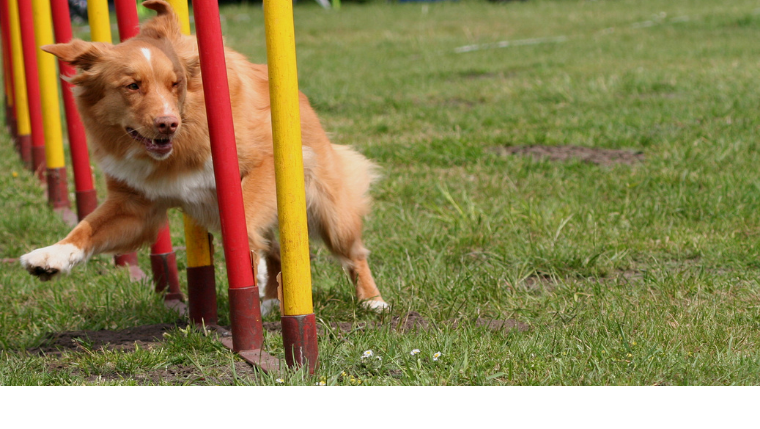
To the casual eye, the Nova Scotia Duck Tolling Retriever looks somewhat like a Golden Retriever, but with a more copper-coloured coat and white markings. But in temperament, these breeds are very different.
Compared to Golden Retrievers Nova Scotia Duck Tolling Retriever
Compared to Golden Retrievers, most Tollers are less submissive, less outgoing with strangers, and less adaptable to a low-exercise household. This high-energy breed is a joy in the right hands – but “too much dog” for someone looking for an eager-to-please couch potato.

Nova Scotia Duck Tolling & Golden Retrievers
The Nova Scotia Duck Tolling Retriever needs plenty of exercises, especially fetching and swimming. Mental exercise (advanced obedience, agility, tracking, fieldwork) is just as important. This breed is not a good choice for a casual pet.
Reaction to strangers varies from reserved to curious but often includes some initial caution. Therefore, he needs early and ongoing socialization to avoid suspiciousness or timidity.
The Toller is usually OK with other family pets. For example, he may chase your cat but seldom means any harm.
Though bright and clever, most Nova Scotia Duck Tolling Retrievers are easily distracted and easily bored, making training more difficult. Other Tollers are surprisingly strong-willed, testing your rules to see with what they can get away. You must demonstrate consistent leadership and keep training sessions short, upbeat, and challenging.
Golden Retrievers Nova Scotia Duck Tolling Retriever can be Mouthy

As with all retrievers, the Toller can be “mouthy” – you must control his tendency to chew on objects and to mouth your hands. Provide a box filled with toys so he can carry something around in his mouth.
When excited or anxious, Tollers tend to whine and “whistle”, which can be irritating when done to excess.
Pros
If you want a dog with these characteristics?
- Is medium-sized, active, and athletic
- Has a lovely feathered coat in shades of orange/red
- Is high-spirited and thrives on vigorous athletic activities
- Is good-natured and dependable
- Excels in competitive activities such as obedience and agility
A Nova Scotia Duck Tolling Retriever may be right for you.
Cons
If you don’t want to deal with these problems?
- Vigorous exercise requirements
- Rowdiness and exuberant jumping, especially when young
- Destructiveness when bored or not exercised enough or left alone too much
- Fearfulness or suspiciousness when not socialized enough
- Strong-willed mind of his own, requiring a confident owner who can take charge
- Regular brushing and combing
- Shedding
- Barking or whining when excited
A Nova Scotia Duck Tolling Retriever may not be suitable for you.
The Inheritance of Temperament

Remember that the inheritance of temperament is less predictable than the inheritance of physical traits such as size or shedding. Character and behaviour are influence by raising and training.
- You can avoid some negative traits by choosing an ADULT dog from an animal shelter or rescue group. With an adult dog, you can easily see what you’re getting, and plenty of adult Nova Scotia Duck Tolling Retrievers have already proven themselves not to have negative characteristics.
- If you want a puppy, you can avoid negative traits by choosing the right breeder and puppy. Unfortunately, you usually can’t tell whether a puppy has inherited temperament or health problems until he grows up.
- Finally, you can avoid some negative traits by training your Nova Scotia Duck Tolling Retriever to respect you and by following the 11-step care program in my book, 11 Things You Must Do Right To Keep Your Dog Healthy and Happy.
More traits and characteristics of the Nova Scotia Duck Tolling Retriever
Most Concerned if Considering a Nova Scotia Duck Tolling Retriever.
I would be most concerned with these requirements if I were considering a Nova Scotia Duck Tolling Retriever.
- They are providing enough exercise and mental stimulation. Duck Tollers were bred to be working dogs – not simply pets to hang around the house or backyard. Too many people acquire this breed because of its athletic prowess and handsome appearance; they don’t provide enough opportunities for the dog to vent its energy and do interesting things. Bored Tollers express their frustration by barking and destructive chewing.
- If you want an easy-to-live-with pet who doesn’t need much exercise and sleeps most of the day, this is not the breed for you. Instead, most Tollers wish to run, hike, swim, fetch, participate in fieldwork (hunting), agility (obstacle course), advanced obedience, tracking, or similar canine activity.

- The mind of their own. Unlike most Golden Retrievers, most Tollers have an independent mind of their own and can be manipulative or willful. You must show them, through absolute consistency, that you mean what you say. To teach your Toller to listen to you, “Respect Training” is mandatory. Read more about Toller Training.
- They are providing enough socialization. Compared to Golden Retrievers, most Nova Scotia Duck Tolling Retrievers do not greet strangers with blind enthusiasm. Many Tollers are standoffish and need extensive exposure to people and unusual sights and sounds. Otherwise, their natural caution can become shyness or suspiciousness.

6. Grooming and shedding. Tollers require regular brushing and combing and occasional trimming to keep their pretty feathered coat free of mats. And they shed quite a bit, so be prepared for vacuuming!
